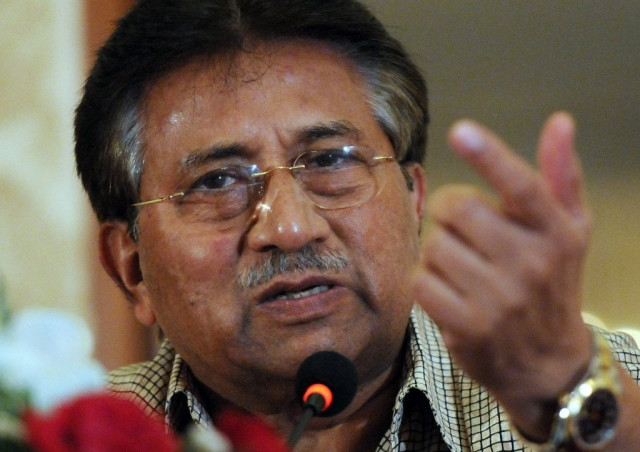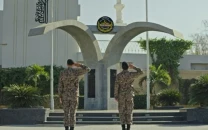Treason case: A trial of Musharraf’s trial
Defence says special court cannot issue arrest warrants; court to give verdict on Friday.

The court needs to decide whether it can try Musharraf, and if it can issue arrest warrants for him. PHOTO: AFP/FILE
The debate surrounding the realm of the special court’s authority in the high treason trial of General (retd) Pervez Musharraf was hotly contested by both the defence and prosecution teams on Wednesday – and the bench has reserved judgment on the matter of its jurisdiction.
Simply put, the court needs to decide whether it can try Musharraf, and if it can issue arrest warrants for him.

The verdict on the matter is of obvious consequence.
In the sixth hearing of the high treason case, the defence argued adamantly that the special court does not have the jurisdiction to issue arrest orders as entailed in the criminal procedure code, and also that the case should be shifted to a military court.
The prosecution, on the other hand, argued that under the 1976 criminal law amendment (special court) act, Musharraf can be arrested and brought before the court if he defies summons – something that is essential for this case to move forward.
The sticking point, as was admitted by the special court, is that there is no precedence of case law in this regard – hence making a call on this matter is tricky and open. The court said it will deliberate over the matter and announce a decision in this regard on Friday.
That the trial had reached a junction of sorts was evident by the expression on the faces of the judges on the three-member bench. As a member of the defence team attempted to discuss other applications, Justice Faisal Arab said, “Our worry is what will be the result of this matter of jurisdiction. We wonder, if we have no jurisdiction, how will we proceed in this trial?”
He also added, “We will decide the matter on Friday. It is a very significant point and all other issues are secondary.”
Anwar Mansoor, one of the leading lawyers in Musharraf’s legal team, quoted a treason trial initiated against Dr Maleeha Lodhi, in which he said the jurisdiction issue was resolved. He expressed optimism over the question of the applicability of the Code of Criminal Procedure which was settled in that case even though he confessed that the case did not reach its ‘logical conclusion’.
A case of high treason was also initiated against former political leader Wali Khan, father of the current chief of the Awami National Party, Asfandyar Wali, but later the proceedings were dropped against him, Mansoor added.
With regards to arrest orders, Mansoor maintained that the special court is conducting constitutional proceedings and cannot look into criminal aspects involved in the case, while prosecutor Akram Sheikh demanded arrest warrants of the accused, stating that the court is authorised to take custody.
Dr Khalid Ranjha, another lawyer for Musharraf, maintained that only the military court has the jurisdiction to try an ex–army chief and no other court could proceed against him.
To this, Justice Arab observed, “In case we transfer the case to a military court, all other objections can be raised before that forum. But if we decide to carry on the trial then we will hear all other objections after deciding this jurisdiction issue.”
Sheikh contended that there is no ambiguity in the formation of the special court which has full authority, except for the powers of a high court. Justice Faisal Arab said that it is understood that a special court is not a high court.
Sheikh also said that a 1980 judgment held that the criminal procedure code could be implemented in case there is any lacuna in the special court. He said the court can seek assistance from the general law to reach any conclusion. He also argued that contempt of court and high treason are two different crimes in nature and that contempt proceedings are of a ‘special nature’ according to the Supreme Court’s decision.
One member of the prosecution team Tariq Hassan told the court there is no question of the case being shifted to a military court as the federal government is already cognizant of the matter. Quoting a French maxim, Hassan stated that it is also the jurisdiction of this court to decide its jurisdiction.
Justice Arab held that in Pakistan, “we are also following the practice where a court decides about its jurisdiction itself”.
After hearing both sides, the court announced that it will decide upon jurisdiction following the criminal procedure code in the trial or transfer the case to military court under the Pakistan Army Act as was prayed by Musharraf’s legal team, on Friday.
Published in The Express Tribune, January 9th, 2014.



















COMMENTS
Comments are moderated and generally will be posted if they are on-topic and not abusive.
For more information, please see our Comments FAQ